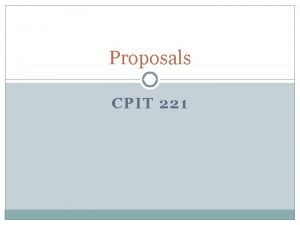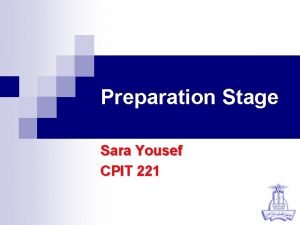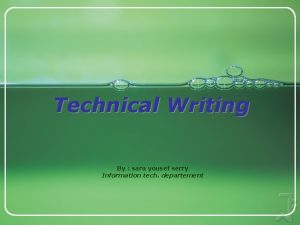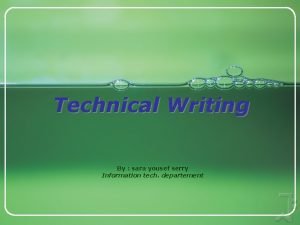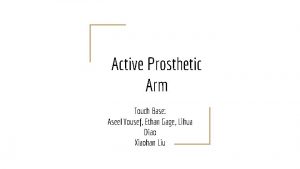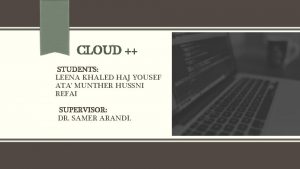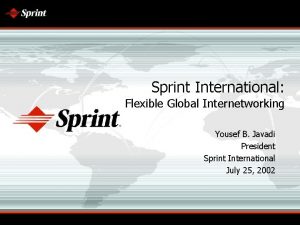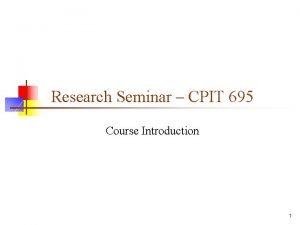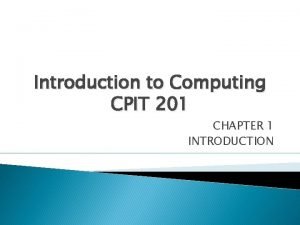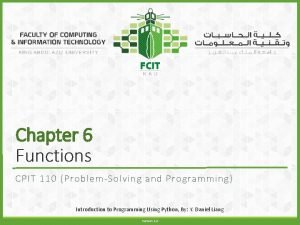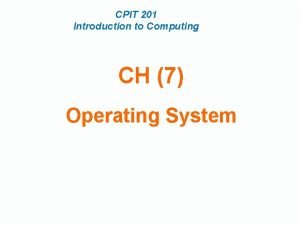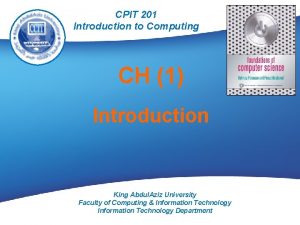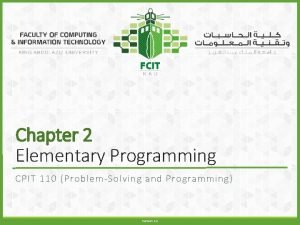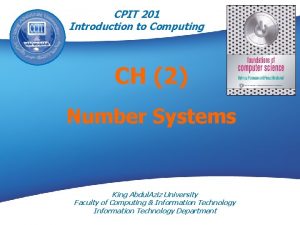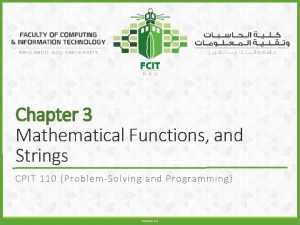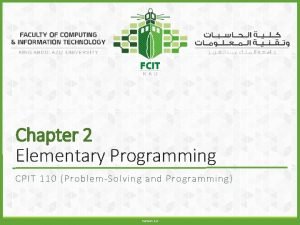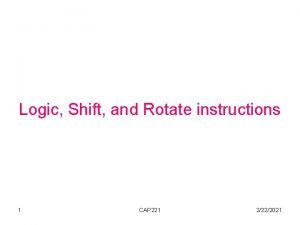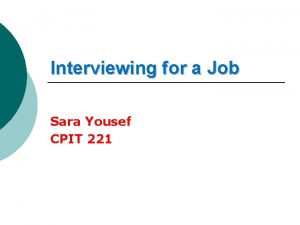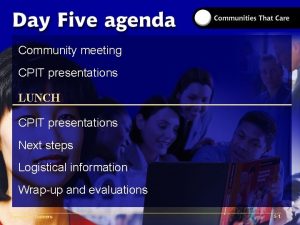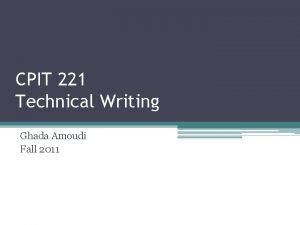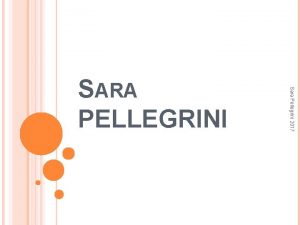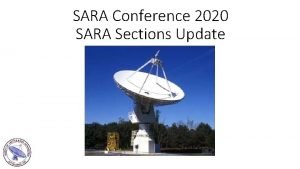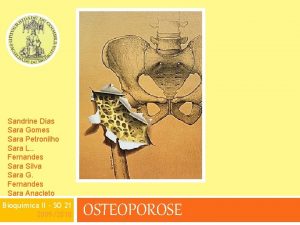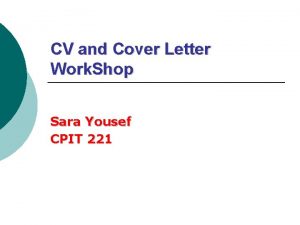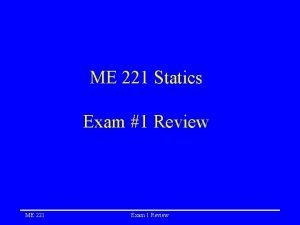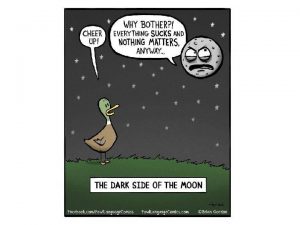Preparation Stage Sara Yousef CPIT 221 Preparation Stage




















- Slides: 20

Preparation Stage Sara Yousef CPIT 221

Preparation Stage n In the preparation stage your goals are to: ¨ Establish purpose ¨ Assess audience and context ¨ Determine scope ¨ Select medium

1. Establish Purpose Ask yourself: n What do I want my readers to know, to believe, or to be able to do after reading my work? n How will the document be judged? ¨ Examples: The resume is successful if I get the job. The report is successful if I convince the audience that we need a new facility.

Be precise n Example: ¨ To report on possible locations for a new research facility ¨ To compare the relative advantages of Paris, Singapore, and San Francisco as possible locations for a new research facility so that top management can choose the best location

Consider the following: Is my purpose too BROAD or too narrow? n Can I complete the work by the deadline? n Is needed information accessible? n Am I passionate about the issue? n

2. Assess Audience Ask yourself: n Who are my reader(s)? n What do they know about the subject? ¨ Affects level of detail, definition of terms ¨ Determines how much background/introductory info is needed ¨ Influences the use of formulae, visuals, etc n What are their attitudes about the subject? ¨ Sceptical, supportive, anxious, bored?

How will They Read my Document? Think about how you read a newspaper, magazine, textbook, novel, dictionary… n If you know how they will read your work, then you can design it better n ¨ Skimming: determining the drift ¨ Scanning: looking for certain info ¨ Searching: looking for specific items ¨ Critical Reading: reading for evaluation

How Will They Read my Document? (II) In the workplace, writing is rarely critically read n To help readers read in the other forms we use: n ¨ Headings ¨ Table of Contents ¨ Lists ¨ Visuals ¨ Abstract ¨ Introduction ¨ Conclusion ¨…

3. Assess Context n Context: the environment / circumstances in which writers produce documents and within which readers interpret their meanings

Examples of the Effect of Context You write a proposal to fund a new project, but the company is currently in a poor economic condition n You reply to a customer complaint, but change your tone based on who is in fault (the customer / your company) n

Ask Yourself: n n What current events might influence how my readers interpret the document? What events/previous documents led to my need to write? What cultural differences might affect my readers’ understanding? What is my professional relationship to my readers (affects style, tone, and scope)?

Signalling Context n In certain forms of writing it’s helpful to remind your readers of the context ¨ Areej, as I promised in my email yesterday, I’ve attached the pictures of the party.

4. Determine the Scope: Scope the depth of detail you include in a document n Scope helps you decide what to include / not include, and how much to include n Scope accelerates research and helps define individual roles in a team n

How to Determine Scope n When determining scope, think of your purpose, audience, context, and constraints: ¨ Time ¨ Energy ¨ Material ¨ Medium (sometimes length/content is predefined)

Example of Scope n The effect of computer games on society n The physical and behavioural effects of computer games on children

5. Select Medium n n Should I use a letter, memo, meeting, email, call, report or fax, etc? Depends on ¨ Audience’s preference/expectation ¨ How widely information needs to be distributed ¨ What kind of records need to be kept ¨ Urgency ¨ Sensitivity/confidentiality ¨ Resources available ¨ Organizational practices/regulations

Written vs. Oral Media Written media is preferred when precise wording or long-term records are required n Oral media is preferred when solving a personal problem or establishing rapport n

Forms of Media & Common Usages Medium Common Usages Letter Job application, references Memo Formal internal communication within an organization File sharing, personal communication Email Call Sensitive issues (tone), substantial interaction Meeting Interviews, negotiations, brainstorming

Conclusion: Test your Understanding What are the five factors to consider in the preparation stage? n Can you define context, scope, medium? n How do we design reports to help our audience read? n When do we uses memos as a medium of communication? n

Conclusion: Test your Understanding n What words define scope in these purposes? ¨To discuss the technical and ethical aspects of maintaining privacy on the Internet ¨To discuss the difference in performance between a Porsche and a Lamborghini

